You have /5 articles left.
Sign up for a free account or log in.
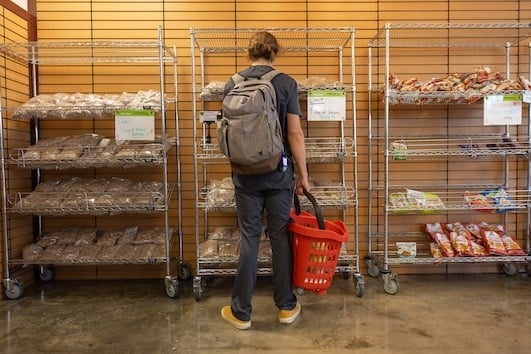
The University of Houston expanded its pantry in spring 2023, growing the space’s physical footprint and increasing the types of foods and supplies offered.
University of Houston
Over the past decade, rising costs of living and student housing rates have added pressure to already strained college learners, creating a new challenge for colleges and universities seeking to retain their students: fighting basic needs insecurity.
A lack of essential resources such as food, housing and clothing, in addition to financial challenges, are among top reasons students say they leave college. May research from Trellis Strategies found 58 percent of students had experienced at least one basic needs challenge—including food insecurity, housing instability or homelessness—and 9 percent of students faced all three concurrently. June data from Ellucian found 57 percent of students have had to choose between college expenses and basic needs, and 59 percent of students have considered dropping out due to financial stress.
To address this issue and provide resources to students, many colleges and universities have opened basic needs resource centers, providing free or discounted food, clothing and housing support. In 2020 the University of Houston opened its Center for Student Advocacy and Community, which houses some of the university’s essential needs programs.
In this episode of Voices of Student Success, host Ashley Mowreader speaks with the University of Houston’s Center for Student Advocacy and Community director, Michael Crook, and associate director, Kevin Nguyen, to learn more about how the center operates, the ties between basic needs and student success, and some of the center’s future goals.
An edited version of the podcast appears below.
Inside Higher Ed: What is the Center for Student Advocacy and Community?
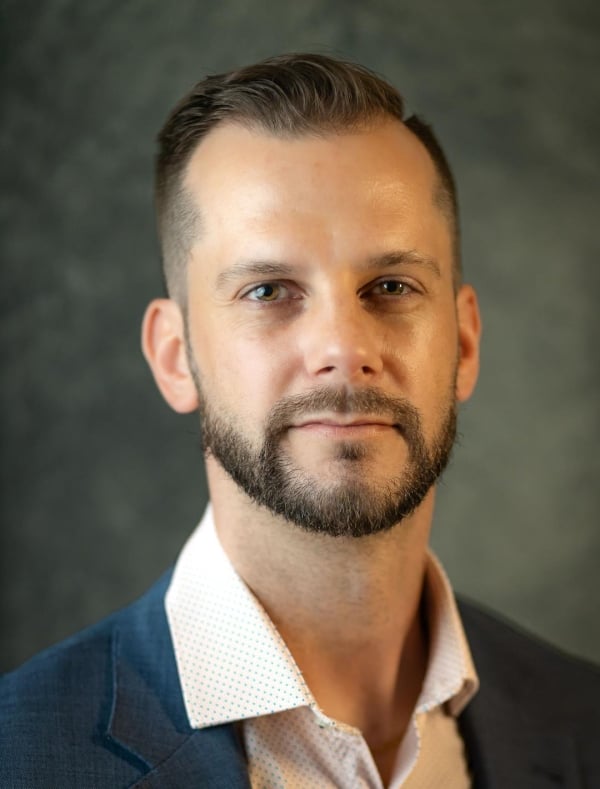
Michael Crook, director of the Center for Student Advocacy and Community
University of Houston
Crook: Really, our mission at the Center for Student Advocacy and Community is that we reduce barriers that inhibit personal and academic success … We help students identify their needs, provide connections to resources and really support student-led programs and initiatives to strengthen the campus community, helping students get connected to campus.
Students like to describe us as a home away from home. We like to say we’re the one-stop shop resource hub for, if students don’t know where to go to get help, find the support that they need, they can stop here first and then we can get them connected anywhere that they need to go based off of what they share.
Inside Higher Ed: At a high level, what is basic needs insecurity? What does that mean on your campus?
Crook: Basic needs insecurity, by definition, is someone who lacks or fears of lacking essential resources such as food, housing, childcare, transportation [and] maybe they have some mental health needs. We also include really a sense of connection and belonging on campus, as well, as a basic need in order for students to do well on campus.
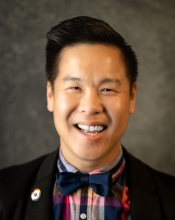
Kevin Nguyen, associate director of the Center for Student Advocacy and Community
University of Houston
Nguyen: I echo a lot of what Michael has said. I also wanted to highlight that at the University of Houston, we also have a CoogsCARE [mental health] program. We really want to promote the healthiest lifestyle that students can have, and within that, we know that some faces and places may not always be the adequate level that they need.
So with our staff, we have folks that range from experiences within admissions, advising, graduation all the way up till they’re done and completed their degrees, but we know in between, there’s going to be life experiences or circumstances that may not always be ideal. So we really want to be there for our students.
Inside Higher Ed: Basic needs insecurity has grown nationally. We’re seeing more students have more concerns about finding food, finding housing, finding the money to pay their bills and things like that. And we know that Maslow’s hierarchy of needs says you need to have all those basic needs covered to thrive and be a fully prepared and ready student at your institution.
Can you talk about how that contributes to the university’s mission to support student success, why is this so critical to the work happening inside and outside of the classroom?
Crook: You said that exactly right with Maslow’s hierarchy of needs. We have some basic foundational needs in order to reach self-actualization [and be] our full or our best selves.
We’re not going to be able to focus on academics, our classes, if our bellies are growling—it’s difficult. It was difficult before [recording] the podcast, when I was hungry. I need to eat something first to be prepared.
The same way, [hunger] is going to impact students when they’re in highly stressful environments, or when they’re working, etc.
A lot of times, the reason why students, I believe, don’t finish or graduate school is not always purely academic reasons. It’s all those other life things that are happening to them that’s preventing them from graduating. We understand that; we get that. A lot of us [staff members] have personal stories related to basic needs and having those addressed or not having those met and trying to get through college.
We just want to make sure that we provide all the resources that students need to have the opportunity to succeed. Of course, we can’t do it for them. I deeply believe in access and opportunity, and by colleges and universities and our department helping to address those basic needs, we can help students be more of their full selves when they’re in the classroom and helping achieve their goals.
Nguyen: I’m also a Houston native, so I think the university also really presents itself as a microcosm of our city at large.
Within that, some of the services and things that we do now I would have loved to have had when I went through college, because I know how difficult it can be, on top of the stress and multitasking and all the responsibilities that are included with being a student.
Being a first-generation student, my parents didn’t give me as much guidance because they didn’t know, and it’s fine, but I also didn’t know where to find those resources or who to reach out to, or wasn’t sure if I could be as transparent or open about some of my struggles and … now, with this growing need for addressing basic needs … becoming less of a stigma, and … also now being approached in a very holistic way, so that we can make sure that students can be good citizens and also contributing members of society.
Inside Higher Ed: How is the university addressing basic needs? What are some of the current strategies and services offered to students?
Crook: There’s really no single solution to addressing, not just food insecurity, but housing and transportation, all the issues that students come across when they’re in school. We’ve got a whole host of different resources.
I think the establishment of our department is one of them. Being a resource hub for students to get them connected and trying to be that one-stop shop. We are a very large campus, over 48,000 students and lots of specialists on campus, and so we want to make it easier for students to be aware and get them to the resources that that they need.
Some of the things that we have in it, we have established the Cougar Cupboard, which I’ll let Kevin talk about here in just a moment, a really robust solution.
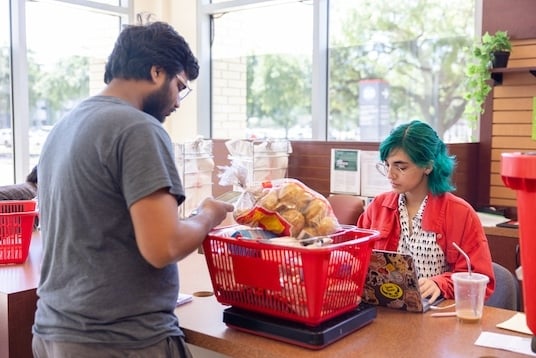
Student workers help guide shoppers through the Cougar Cupboard and ensure students take only 30 pounds of food or less.
University of Houston
But we also have some other things that come out of the department, such as individualized one-on-one resource appointments, where students can complete a form that says, “Hey, I’m struggling. I have these needs,” select a couple boxes and they can meet with us one-on-one, and we’ll talk about, whether it’s food or housing issues or clothing or whatever those might be.
That one-on-one appointment can be so valuable, just because students can feel scared or unsure of where to move. And then after they leave, they have a plan, or at least resources either on campus or off campus that they can go to. We have those individualized resource appointments.
Online, you can see there’s lots of resources that we spent a lot of time going through and finding in the greater Houston community, on and off campus, curating some of the better resources for them to use. So that’s really good.
We have a number of groups that are on campus. I serve as the adviser for the Cougar Closet, so students who want to feel good in their fit … can come pick out their clothes. We collect from the community, but also students helping other students [through donations] just find some good clothes every Friday that they want to wear.
We do some survey gathering to try to get a little bit more information about what is the actual need. We have work groups established trying to establish a more sustainable emergency aid–type retention grant; that’s in progress. So a lot of different prongs and different areas to address the various different basic needs. But the Cougar Cupboard is something that we’re really proud of on this campus.
Nguyen: We have a lot of great experts and folks that want to help students in all aspects of their identities, their living situations, their circumstances. One of those areas that we have really focused on is a Cougar Cupboard.
We were established in January of 2020, so [we began operating] right during the pandemic, and that was also another hurdle that we had to navigate. But then in itself, we’re wanting to make sure that these students are seeing the support, and so we also lean on other resources and folks, alumni associations and networks and a greater community at large.
We’re really excited and glad that we have a partnership with our local food bank, which is the Houston Food Bank. They provide us with supplies and items that range from produce to ready-to-go meals and also even hygiene products sometimes, depending on what they have in their inventory.
We have seen such a growth with our Cougar Cupboard. When we started out in a small office in the campus rec, it was getting about maybe 50 to 500 student visits. Now we’re in the thousands. In 2023 I think we surpassed 10,000, and even in these first two weeks when we started our fall semester of 2024, we saw over 400 new students register to our Cougar Cupboard. There is a growing need. We’re glad that we can provide that 30 pounds of food and grocery items for them.
We also want to provide other aspects within that, because it’s just not getting fed. It’s also providing some nutrition facts. We also do nutrition workshops. We work with our student organizations a lot. The student organizations, like our metropolitan volunteer program, MVP for short, also helps us out on the Cougar Closet. So it’s also students helping other students, and that really becomes very much of a mutual goal for everyone on campus to address these basic needs, but also focus on one of the main words of our center’s titles, which is “community.” We are really wanting to have students feel, again, home away from home, because then sometimes some other people’s home situations aren’t as ideal as others.
Inside Higher Ed: One of the central missions of your office is access, making sure that students know and have the ability to use these resources. As a newish office and cupboard on campus, can you talk about outreach and making sure that students are aware of these services and that they’re utilizing them?
Crook: We do a lot of things. We try to reach the students where we’re at in any way that we can. So much of our success, I think, as a department, especially being somewhat new, is that it’s related to our collaborative nature, both as individual staff members, but then as a department as a whole. We build ourselves into what are some already successful programs that are already going on—that train’s already moving this direction, we hop on and it kind of does the work for us.
The other thing is that we’re community builders as people, as an office, and we just want to bring people closer together. So once people know and trust that you care about them, they’re willing to listen to whatever that you say or do, and so we do that.
We have a number of community building–type activities throughout the year that are social in nature. During weeks of welcome, we have major mixers that students will come in and interact and get to know and then they just think, “It’s a fun mixer, social party where there’s DJs and food and, like, easy activities.” But then we throw in, “Hey, this is the Cougar Cupboard; if you ever have a need, don’t forget.”
We’re very intentional about making sure our center staff, whenever we present workshops or anything else, we don’t just show our face, we show our entire team space so that people know the name and the people so they can connect when they see us across campus.
I know Kevin gets stopped all the time—“Hey, I saw you” or “I knew you elsewhere,” from some other place, and then they ask a bunch of unrelated questions. That’s exactly what we want to do.
We put ourselves in Coug News, the standard marketing channels. We do weekly email distributions. We’ll do social medias, trying to keep those relevant, that students will follow the content in general.
The other thing is, it’s not just— For example, with the Cougar Cupboard, we’re not just giving out food, but we’re also giving nutrition workshops. There’s different ways that people can engage at different points.
I talked about those mixers that were really popular in the beginning of the school year. Well, students are like, “We want them every week.” Unfortunately, we can’t do that, and that’s a lot of work. So we have this event now, we call it Together Thursdays, every Thursday morning, [we provide a] really quick breakfast snack, whether it’s a kolache or a doughnut or something small, really low cost, and we have a little Keurig coffeemaker, some tea.
Students can come in, it’s a grab-and-go–type event, but we’ve partnered with student organizations—because we know that’s the lifeblood of this organization. Nothing’s going to be successful if we don’t bring in student groups. They sponsor, if you will, the events, meaning they just show up and they lead some sort of social activity to help people get connected. They get a table talk about their organization. We provide the food, and we have 100, 150 people come in every Thursday.
At that point in time, we also notice that those students who come to that are maybe not coming to other events. If you get food, students are going to come. We meet them where they’re at, then we talk about all of our different resources that are there.
Those are some of the ways that we reach out.
And then, honestly, it’s word of mouth. People, once they hear [about] us, they have a really good experience. They’ll tell their friends.
Yesterday, we just had student groups in our office, for example. Every night, our office is booked out, so students can reserve the space to be in here, and they’re like, “I didn’t even know about this space, but it just feels welcoming.” Part of that is even the physical space can be really powerful and outreach to students. Once they get in the space, we don’t have to say anything, but we have affirmations on the wall, we have a welcoming environment. We have blankets for students to use, charging stations, things that students would want … Then we get them with information, and then we ask them about their grades, their tests and their study habits, and have they eaten?
The other thing that I’ll throw out there, Kevin talked about the Cougar Cupboard, which is a huge, over 2,000-square-foot space that students can use. But we also have little pocket pantries. So in our office, come by every day, it’s from floor to ceiling resource wall. People can pick up hygiene products or maybe just a granola bar or something in between class. They can pick up two items each day. It doesn’t get them in just once, but it helps them come back throughout the year.
The outreach isn’t just a one-off help you, but it says, “Hey, we teach you, and we develop things that you can come back weekly for breakfast or daily for this little snack, or just in general,” and so that helps us build a better, closer community on such a large campus.
Inside Higher Ed: Kevin, earlier you mentioned stigma around using basic needs resources to address insecurity. How is that reflected on campus? How is the office trying to encourage students to utilize resources as available?
Nguyen: When we talk about … stigma or just treating individuals as the genuine, beautiful human beings that they are, it also reflects on our own staff, because then we treat one another and check in on each other and make sure that we are also taking care of one another, but then it also gives a little bit more genuine interactions with one another to see how we can do genuine interactions with our students.
Part of how we reduce stigma with our Cougar Cupboard is we have a great relationship with our student housing and residential life. We got a new space since we saw the growing need coming from the Campus Rec; now we’re going to be in a residential space, so we’re really meeting where the students are.
We created it and made the space look like and feel like a little store. Students check in, we double-check to make sure that, for data purposes and just to make sure that they have registered for our program, that they have a UH ID number, they’re an enrolled student. Then they also get given a … Houston Food Bank number, so that we can also share that data and information [with] them because we receive items and donations from them.
They check in, they get a little handbasket or rolling card, depending [on] what they need. They walk through the space. They all stop by the dry goods and canned goods first, and then there’s a produce section. We are fortunate to have two refrigeration units and a freezer unit that makes more items last longer, and also that students can take home. Then at the end, they check out, we make sure that they don’t exceed their 30 pounds. We also help them bag their stuff and so that they can take home. But we make the process feel as if it’s natural.
All our student staff are amazing, because they are always greeting folks with smiles, and there are no judgments or weird looks or anything, because we just don’t know where people’s circumstances are at. It makes more students talk about our space and vibrant colors, and we just make sure that they have a good experience the whole time.
That is how we reduce some of the stigma. Because we know students have needs. As long as we’re helping meet them, they feel that genuine altruism that comes with helping our students. Some of them have experienced it themselves, or some of our even our student staff are— Who are users as well, and so it really comes from a genuine place of care and support.
Crook: It’s the openness. Many of us, we have stories that are related to it, we share that. It’s like, “I used to be that way, too. I am that way.” It’s the relatability.
Oftentimes things hurt you more when you can’t name it, whether that’s some sort of diagnosis that you’re waiting for, or something, internal feelings that are overwhelming. Sometimes if you name it, it has less power. So if we just name food insecurity and say, “Hey, it exists.” We have data that backs it up. National data, one in three students are experiencing food insecurity on our campus. We have some of the data to back that up that suggests that it’s that way here on UH’s campus, as well.
The other thing is, students will—we’re friendly and students like us a little bit, I suppose—but they’re always going to connect better with one another. So we have, like Kevin was mentioning, students, and we put them in the forefront, having them speak, having them share their stories, getting media attention.
Last semester, we partnered with [a] communications class, and they helped us with our marketing, [like], “We’re your client; improve our situation.” And through that whole process, they got really excited, and they started advertising all the great offerings.
When you say free groceries for any student, there’s no parameter, nothing that’s needed, you reduce those barriers, you increase the access and then there’s less stigma as well.
The other side thing is that we also recognize that some people don’t want to be seen coming in and out of the cupboard sometimes. We have decorative, really colorful outside space, the decals, but they’re actually privacy screens as well. So you can’t see inside, but you can see outside, and sun still comes in. Small details and attention like that. All of it just helps the overall experience.
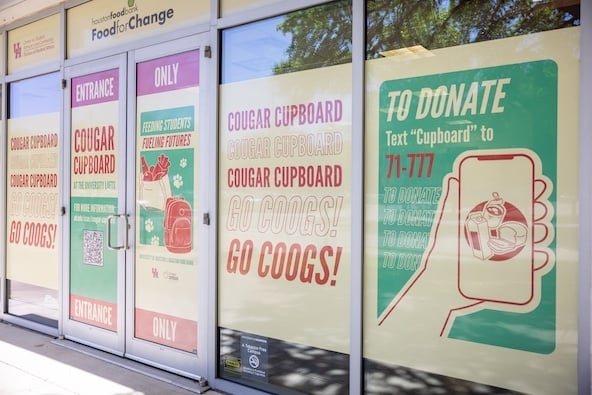
The Cougar Cupboard has large, colorful window decals that serve as privacy screens, making the experience more private for students while still allowing natural light into the space.
University of Houston
I don’t know if you mentioned the coloring books that we have there, the coloring stuff and activities and fidget spinner stuff that we have in the space, too, so people can just hang out in the space as well. Creates a different vibe when you go in there.
All of what we’re trying to do is just reduce the line in terms of, we know that the need is great. Sometimes we’re really excited when we can serve 500 people in a day, like today, but then also it’s like, wow, that’s 500 people who depend on this resource every single week.
Inside Higher Ed: Resources and funding are obviously huge obstacles in this work for a lot of institutions. When it comes to resources and partners, you mentioned working with the local food bank, but who are some of those other groups that are supporting this initiative? What makes those partnerships work?
Nguyen: We have a good amount of folks, but we will always welcome more, because resources are limited. We have a great relationship with our local credit union, the TDECU, which stands for the Texas Dow Employee Credit Union. They are a frequent sponsor for us, and we are very grateful for what they have given to us. They also help us with financial literacy workshops or provide events where we can promote the cupboard, but also make sure that we’re also touching on different aspects of student life.
We also have a relationship with American Heart Association. They are also very giving people that want to help support everyone, anyone and especially students. Part of that was helping us try to become more of a pantry that provides healthier items and also guidance on what kind of items that we can give out. So they have given us some her guidelines, which is H.E.R.—healthy eating recommendations. We have a stoplight system that we’re going to implement where red [items] are “going to choose rarely,” yellows are “choose sometimes,” then greens, or “choose often,” for more of the nutritious items that we have. That is one a great partnership we have, too.
Then there’s some people that are very just giving people. Alumni give to us either groceries or even monetary values. We have fun, friendly food drive competitions with our Big 12 partners, other universities, colleges that are also having food pantries. During one of our food drives, part of the ticket sales went to the Cougar Cupboard.
There was also a generous donation of $10,000 from Baytex Energy, because the person that donated the money was a spouse of a professor here at university who heard about our Cougar Cupboard services. We are so grateful for that, and that is always a growing need. But we also know that with inflation, grocery prices going up and other items going up, that any financial help is always appreciated, and we continue trying to do the work and be good stewards of that money.
Crooks: It’s definitely a collective effort. There’s no way that we can make this happen [alone]. It takes a village. All of our sponsors, our donors, the partnerships that are that are built in that Kevin mentioned, are truly vital.
We love the American Heart Association, such an unexpected group. But they come in and they’re saying, “Hey, we want everyone to not just eat, but eat healthy.”
It’s a partnership where you have people who are values aligned, who are financially aligned, when everyone has a role and everyone has a part.
Then there’s our volunteers. We can’t run without the volunteers. The people power to make this operation work is immense, and students want it to be open up more, but we need more staffing, that kind of thing. So we rely heavily on the students, the partners, the community partners, Coug moms—they give us a small grant every year. So we will take anything from everywhere.
Nguyen: I really appreciate the community efforts, because then it really, truly becomes a collective. The American Heart Association is also helping us out by connecting us with other local colleges, universities, community colleges, food banks that are in the Houston area and surrounding areas. They’ve been doing meetings where we can gather together to talk about tips, tricks … best practices, or what we’ve learned from our own experiences.
Some people are just starting to implement or initiate a food pantry on their campus, and so we’re always exchanging ideas, contact information, and also helping each other out. Again, with the Big 12, we have, there is a Big 12 food pantry alliance that meets, and then talk about things that work in their space and places.
I like to talk about the Cougar Cupboard that it’s like running a nonprofit at a state institution. There’s a lot of different layers that come in with how to navigate those dynamics. And it’s great that we have so many folks and resources and connections that we can talk to and also refer to, so that we can all do the work together.
Inside Higher Ed: What’s next for your office and the cupboard?
Crook: So many dreams.
Our president, Renu Khator, she said once … at her president’s address, “You can dream big or you can dream small. It still costs the same.” So we’re over here, we try to dream big … but we’ll take small steps each year and see if we can build on it.
Right now, I think we have students getting to know our office, getting to know that we are the resource, we are the place where they can go. We still offer a very welcoming community vibe, and we’re here for you, whatever that need might be. Basic needs goes far beyond just food insecurity, and I think the cupboard, that is maybe the flagship offering that we have right now, and it still continues to grow and work, and we need some additional sponsorships and maybe staffing to make that work.
Getting our data, collecting the stories, the testimonies to prove that value.
On that realm, I think for some of our other areas of the department … we want to look at, how can we address housing insecurity? There are a lot of students who are sleeping in different places every night. It’s just as difficult to focus on school when you don’t have a consistent place to study and keep your things and stuff. We want to continue to look at, what are those other resources? Housing insecurity, transportation.
We’re in a huge city. Some students are taking a bus for two hours. Some staff come in two hours to and from work every single day to just get on to campus. So how do we just make it easier for them? How do we shorten the line?
We want to get an emergency grant; something really sustainable for the department is a priority for me, for if student is experiencing an emergency. This is a retention grant. This is some you can come in here. We will provide you the help and the support, not do it for you, but just enough to stay in school. I think those are some of the things, but continue to develop those.
Nguyen: Some of the dreams and goals that I can think of right now with the Cougar Cupboard is with our diverse student population, we want more diverse offerings of food items and stuff, too, but also educational [programs]. We want to provide more Asian cuisines or recipes and stuff. And then when people see a different kind of vegetable or fruit, they’re unsure about how to use it, utilize it or even what kind of nutritious value they have. That is something that we want to, hopefully, expand.
We have a very strong international student population here at the University of Houston, so we want to also create that environment for them, too, and that support. Then also with our international students, sometimes they don’t always get to go home during holidays, and so we’d like to be open more often or extended a little bit if we can, if we have the staff and means to. But also give them that sense of community while other folks may not be on campus, or not as many people on campus, that we can hopefully work more year-round and be open so that we can always continue being a resource.







